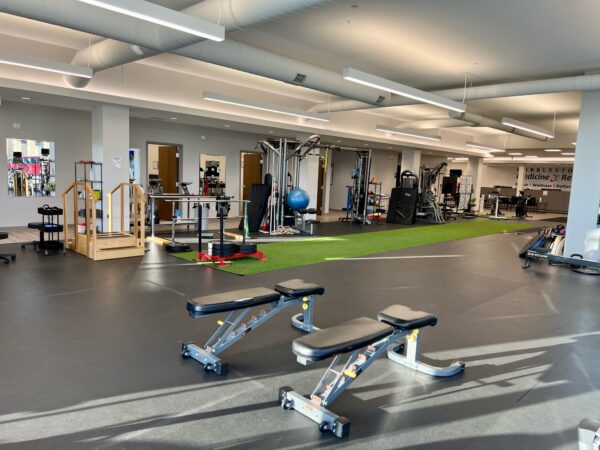
An injury or accident can sometimes prevent you from performing your professional responsibilities. You can’t just pick up where you left off—or, at least, not right away. When the time is right in your recovery to talk about getting you back to the workplace, you may be asked to complete a functional abilities evaluation.
Not sure what a functional abilities evaluation is and how it can help? We’ve got you covered.
A functional abilities evaluation (FAE) or functional capacity evaluation (FCE) is a comprehensive evaluation of your physical and functional abilities, using objective and measurable tests.
The FAE can be general or specific to your job and related duties. Once the evaluation takes place, it is interpreted and presented to all concerned parties in a report or used to fill out a functional abilities form.
If you or your client has sustained an injury and are in need of return to work planning, work modification suggestions, legal interpretation of the impact of injury and/or recommendations regarding ongoing rehabilitation, perhaps a functional evaluation would be useful. Cobblestone Medicine and Rehab Centres are pleased to provide comprehensive functional capacity evaluations (FCE) at our CMR Brant Location located inside the Cowan Community Healthcare Hub, Paris, ON.

An FAE establishes an outline of what physical level of work you are able to perform.
Depending on the nature of your injury and the type of work you do, before you return to work after an injury or accident, a functional abilities evaluation may be used to help determine your abilities and outline any immediate or long-term risks from resuming normal at-work functions. The purpose of the FAE is to objectively identify impairments or disabilities and how they may affect your ability to return to certain parts or all of your normal work duties. The FAE can also determine which job modifications or restrictions are required to protect your current abilities and prevent future injury.
While treatment is not part of the FAE, the evaluation process can also be used to predict potential improvements to abilities if a rehabilitation program is implemented.
Our evaluation fees are determined based on several factors that are taken into consideration when conducting an assessment. These factors include the length of time required for the assessment, which can range from one to two days, depending on the complexity and scope of the evaluation.
Additionally, the cost of the assessment may also be influenced by the need for specialized care and analysis, such as in the case of a vestibular or head trauma fopcused FCE, or access to job demands analysis.
Furthermore, the cost of the assessment may also be affected by the need for opinions based on the results of the assessment, such as medical-legal opines.
Since there are various factors involved in the assessment procedure, we highly recommend that you get in touch with our clinic directly to determine the cost of the assessment. During your initial contact with us, we will provide you with a quote that is tailored to your specific requirements.
The FAE will examine your physical abilities using a review of your medical documentation, interview processes and objective physical testing. Following a musculoskeletal examination (a check of bone, muscle, ligament and nervous system health), a healthcare professional will lead you through functional tasks such as walking, climbing stairs, as well as gripping, lifting, pushing and pulling objects. Repetitive activities and those requiring fine motor skills are often both a part of the tests. By simulating everyday life skills and job-specific skills, the FAE can evaluate abilities, determine risks and define impairments.
Standardized tests, questionnaires and interviews may also be used to evaluate cognitive abilities and psychosocial behaviour, in relation to traits required for your job.
The FAE will often compare your abilities with the physical demands of your specific job, by looking at your work responsibilities and environment.
Evaluators will be watching for consistency of effort and barriers throughout the process.
Although the FAE may recommend specific work conditioning or work hardening programs, treatment is not typically included. Such conditioning programs are designed specifically to improve the abilities required of your current workplace and would ideally be connected to the assessment and recommendations provided in your FAE, as well as the healthcare professionals behind them.
The length of the FAE varies depending on your needs, the scope of your job requirements and the extent of your injury. Most assessments are intensive and last one to two consecutive days, with three to six hours of assessment per day. The full report is provided at a later date.
Functional abilities evaluations are often performed by registered physiotherapists, chiropractors, occupational therapists and kinesiologists. They have the combination of knowledge, skills and experience needed to assess your physical and biomechanical function and effectively evaluate that function in light of your workplace requirements.
Our typical time for assessment is 7-14 days, depending on the client’s schedule. We also try to make sure all report writing is completed within 7 regular clinic business days.
During our testing process, we conduct a thorough review of medical documentation and carry out intensive interviews with the client to gain a subjective assessment. We also use standardized tests and work/activity simulations to identify the client’s functional abilities and limitations objectively.
After testing, we provide a report that outlines the client’s current functional abilities and limitations. The report can help determine the client’s ability to return to their pre-injury occupation, residual functional abilities and limitations related to work, leisure, and household activity, and future rehabilitation needs.
Furthermore, we provide conclusions regarding the client’s level of physical effort during testing and the consistency of their subjective reports of pain and disability in comparison to objective test results.
In addition, if required, we can also provide a cost of Future Care Evaluation along with a Functional Capacity Evaluation for efficiency and cost-effectiveness to the referral source.
Following a work injury or accident, your health insurance provider, employer, legal representative or a worker’s compensation board (WSIB) can request an FAE be conducted. The FAE allows objective collection of information on your abilities and limitations, and provides data interpreted for use in injury/accident compensation matters, as well as a work reintegration process.
An FAE is just one type of evaluation that may be conducted when a transition back to work following an injury is being planned. Some other possible types of evaluations that may be requested are:
Occupational therapy home assessment
An occupational therapist may visit your home to determine any environmental barriers and risks, and provide recommendations for home assistance.
Ergonomic assessment of a workstation
Ergonomics is the study of people’s efficiency in their working environment, often focused on improving workspaces to minimize risk of injury or harm.
An ergonomic assessment of your workstation and overall work environment is often conducted with the injured worker present or by an assessor and another individual, to demonstrate or perform the required activities.


While workplace ergonomics are often evaluated after an injury or accident, employers can seek out ergonomic consultations to help prevent injuries, such as those from repetitive strain. A consultant can identify areas of risk and make recommendations for improving workplace design.
If you are scheduled for a Functional Capacity Evaluation, please take note of the following details to make your evaluation a seamless experience:
– Comfortable Clothes: It is recommended to wear comfortable and loose-fitting clothes such as shorts and a t-shirt. You may also bring any adaptive aids like a knee brace that you currently use to make the evaluation more comfortable. It is important to note that you will be asked to perform various physical activities during the evaluation, so make sure to dress appropriately.
– Medication Regimen: It is essential not to modify your medication regimen before the test. Changing medications before the evaluation may affect the accuracy of your results, so it is recommended to continue with your regular regimen.
– Caffeine and Cigarettes: It is highly recommended to avoid consuming caffeine or smoking any cigarettes at least one hour before the evaluation. These substances may affect your heart rate, blood pressure, and overall performance during the test.
– Snacks and Water Bottle: The evaluation may take up to 4 to 6 hours, so it is recommended to bring a light snack and a water bottle to sustain your energy levels throughout the process. It is important to note that you may have short breaks during the evaluation, so make sure to bring snacks that are easy to eat and will not affect your performance.
If you have any questions, we are here to help at Cobblestone Medicine and Rehab Centres!
Contact us directly – (519) 442-2237
3 Locations to serve you better!
Happy to serve Brant County, Paris, Brantford, Simcoe, Woodstock, Burford and surrounding areas!